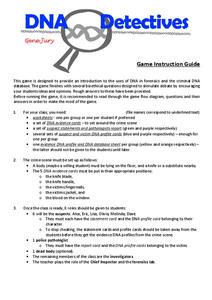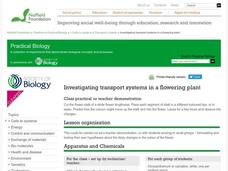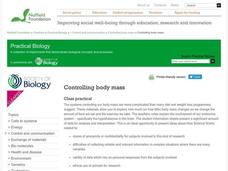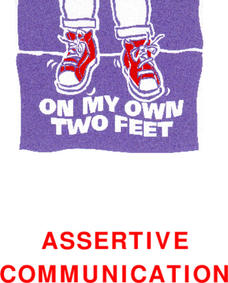University of Minnesota
Ethics of Dissection
There's an elephant in your classroom. That's right — a big, awkward elephant named Dissection. Sure, you'd like to talk about him ... but how? Whether you're a seasoned teacher or fresh out of student teaching, the topic of dissection...
Gene Jury
DNA Detectives
Police find a man murdered in a local hotel, DNA everywhere, and now they need scholars' help. Budding detectives step into a crime scene playing the roles of victim, suspects, and investigators. They apply knowledge of criminology and...
Curated OER
Science and Cloning
Here is an ambitious lesson which has learners take a look at which nations came up with the most important scientific inventions/advancements during the 20th century. Focusing on group work, cloning is explored. All of the worksheets...
University of Waikato
Farming and Environmental Issues
Forming ethical arguments is sometimes a complicated task. Guide classes through a process for forming and presenting ethical opinions. Learners consider the views of all stakeholders on the impact of farming on the environment and the...
Children’s Hospital of Philadelphia
Vaccine History and Research
It all becomes a matter of timing. Groups use a variety of resources to research the history of vaccines by first creating a timeline of vaccine research using leading scientists' work. Learners read articles to develop a story of the...
Kenan Fellows
An Analytical Chemist, a Biochemist, an Animal Scientist, and an Oncologist Walk into a Lab...No Joke
Oncology presents multiple opportunities for research and the collaboration of many different types of scientists. Scholars divide into groups and research the history of mass spectrometry, polarity/non-polarity,...
Curated OER
Biodiversity Debate - Stream Side Science
Role play community members who are both for and against the construction of a dam. Research the pros and cons and then hold a classroom debate. This activity ideally follows a series of stream studies, links to which are included. Use...
Polar Bears International
Taking Action!
Motivate young scientists to stand up and take action with this environmental science lesson. To begin, the class works in small groups brainstorming actions that support the conservation of the earth before creating and implementing an...
Children’s Hospital of Philadelphia
Learning From Animals
Is all research on animals bad? Learners use a video to understand how animal research benefits humans. Pupils read about a drug modification turned deadly and the result of the 1938 Federal Food, Drug, and Cosmetic Act. Scholars use a...
Personal Genetics Education Project
Reproductive Genetic Testing: Technology, Access, and Decision Making
Explore the complexities of reproductive genetic testing respectfully in the learning space. Scientists read articles, view a slideshow, and complete a do-now about genetic technologies. A fishbowl activity allows scholars to discuss the...
Curated OER
"Tomorrow and Tomorrow and Tomorrow"
Do you want to live forever? After reading Kurt Vonnegut’s short story, “Tomorrow and Tomorrow and Tomorrow,” class groups adopt the roles of an ethics committee, product manufacturers, concerned scientists, and potential users of an...
Curated OER
Human Cloning: Is it Biological Plagiarism?
Is cloning good or harmful? Help your class understand the risks and benefits as they read, research, and discuss human cloning. Individuals form teams, research information, and present to the class before concluding with an in-depth...
Nuffield Foundation
Investigating Transport Systems in a Flowering Plant
Some weddings have flowers in a unique, unnatural color to match the theme. Young scientists take part in this process to learn about the function of the xylem as they observe colored water moving through a flower. Then, they experiment...
Curated OER
Kildare, USA: An Environmental Health Simulation
Your biology class plays the role of epidemiologist when a mysterious illness breaks out in Kildare, USA. Using interviews with doctors, patients, and local citizens, maps, the results from different materials sampling, they work to...
Nuffield Foundation
Controlling Body Mass
Many variables impact your body mass, not just diet and exercise. Scholars collect and study data about body mass to better understand the complexity of a sensitive topic. They learn about leptin deficiency, the hypothalamus, and more.
Nuffield Foundation
Assessing Human Hearing
Young scientists explore hearing through multiple experiments, demonstrations, and activities. They focus on the changes in hearing over a lifetime, how we can determine where a sound is coming from, and the ability to filter noises.
Nuffield Foundation
Investigating How We See Colour
Can you eyes be fooled into seeing colors that aren't actually there? Budding scientists view a presentation that addresses this topic. They explore how their eyes interpret color through the retinas and messages sent to the brain. They...
Department of Education (Ireland)
Assertive Communication
Assertive communication is an acquired skill. Teaching young people to ask for what they need and to believe that they have a right to ask is at the core of a unit on assertive communication. Over the course of the unit, middle and high...
Curated OER
Compare and Contrast Night to Life is Beautiful
After reading Elie Wiesel's Night, watching the movie Life is Beautiful, and researching World War II, class members write a comparison essay on the book and film. This includes a prior knowledge activity, discussion in whole and small...


















